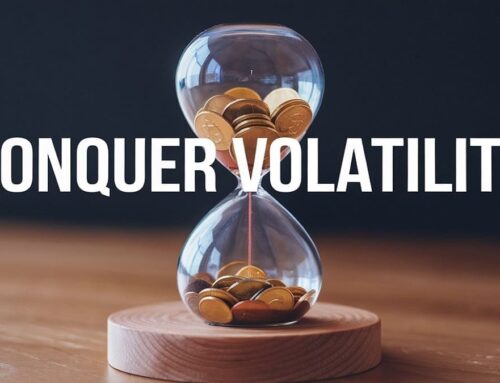
Ethical Investing
Imagine this: You’re sitting at your desk, scrolling through investment opportunities. On one hand, there’s a high-return fund tied to fossil fuels and questionable labor practices.
On the other, there’s an option that aligns with your values, supporting renewable energy, fair wages and sustainable practices. Which would you choose?
If the idea of growing your wealth while staying true to your principles excites you, then ethical investing might just be the perfect path for you.
Ethical investing isn’t just about making money; it’s about making a difference. By putting your dollars into companies and funds that prioritize social responsibility, environmental sustainability and ethical governance, you can grow your wealth without compromising your values.
As Mahatma Gandhi once said, “The future depends on what you do today.” And when it comes to investing, the choices you make today can shape not only your financial future but also the world we live in.
So, let’s dive into the basics of ethical investing and explore how you can use it to build a portfolio that reflects both your financial goals and your moral compass.
What Is Ethical Investing and Why Does It Matter?
At its core, ethical investing is about aligning your investments with your personal beliefs and values. It goes by many names, Socially Responsible Investing (SRI), impact investing or ESG investing (Environmental, Social and Governance).
But no matter what you call it, the goal is the same: to support businesses that are doing good in the world while avoiding those that harm people or the planet.
Why does this matter? Because every dollar you invest has power. When you buy shares in a company, you’re essentially voting with your wallet. Are you supporting industries that exploit workers or pollute the environment? Or are you backing organizations that promote clean energy, equality and transparency?
The choice is yours and the ripple effects of your decisions extend far beyond your bank account.
But here’s the real question: Can ethical investing really help you grow your wealth? The short answer is yes, but there’s more to it than meets the eye.
Let’s break it down step by step.
The Rise of Ethical Investing: A Growing Trend
Over the past decade, ethical investing has surged in popularity. According to reports, assets under management in ESG-focused funds have skyrocketed, reaching trillions of dollars globally. This shift isn’t surprising.
As consumers become more aware of global challenges like climate change, inequality and corporate misconduct, they’re demanding accountability, not just from governments but also from corporations and investors.
For instance, younger generations, particularly Millennials and Gen Z, are leading the charge toward ethical investing. They want their portfolios to reflect their values, whether that means fighting climate change, promoting diversity or advocating for human rights.
Even institutional investors, such as pension funds and universities, are jumping on board, recognizing that ethical practices often lead to long-term stability and profitability.
This trend proves that ethical investing isn’t just a feel-good movement, it’s a smart financial strategy. Companies with strong ESG ratings tend to outperform their peers over time because they’re better equipped to manage risks and adapt to changing market conditions.
So, if you’ve been hesitant to explore ethical investing, now is the perfect time to start.
How Ethical Investing Works: Aligning Values with Returns
Before diving into the nuts and bolts of ethical investing, let’s clarify how it works. Unlike traditional investing, which focuses solely on financial returns, ethical investing considers three key factors.
- Environmental Impact : Does the company prioritize sustainability, reduce carbon emissions and protect natural resources?
- Social Responsibility : Does it treat employees fairly, support local communities and uphold human rights?
- Governance Practices : Is the company transparent, accountable and free from corruption?
These criteria form the foundation of ESG investing, helping investors identify companies that balance profit with purpose. But how do you find these gems? Here are some practical steps.
Step 1: Define Your Values
Start by asking yourself: What issues matter most to me? Climate action? Gender equality? Animal welfare? Once you know your priorities, you can narrow down your options. For example, if you care deeply about renewable energy, look for green bonds or solar energy stocks.
Step 2: Research Investment Options
There are several ways to engage in ethical investing.
- ESG Funds : Mutual funds or ETFs that screen companies based on environmental, social and governance criteria.
- Impact Investments : Direct investments in projects or businesses aimed at solving specific problems, like affordable housing or education access.
- Community Investing : Supporting local initiatives, such as credit unions or microfinance programs, that empower underserved populations.
Step 3: Evaluate Performance
While ethical investing emphasizes values, it doesn’t ignore returns. Look for funds or companies with solid track records and competitive performance metrics. Remember, the goal is to grow your wealth sustainably, not sacrifice it for ethics alone.
Debunking Myths About Ethical Investing
Despite its growing popularity, ethical investing still faces skepticism. Some critics argue that prioritizing values over profits leads to lower returns. Others claim it’s too complicated or inaccessible for the average investor. Let’s address these misconceptions head-on.
Myth #1: Ethical Investing Sacrifices Returns
Reality: Studies consistently show that ethical investments perform as well as or even better than, traditional ones. In fact, companies with strong ESG practices often exhibit greater resilience during economic downturns. Why? Because they’re less likely to face scandals, lawsuits or regulatory fines that could tank their stock prices.
Myth #2: It’s Only for Wealthy Investors
Reality: Thanks to advancements in technology, ethical investing is more accessible than ever. Platforms like Betterment, Ellevest and Robinhood offer low-cost ESG portfolios tailored to individual investors. You don’t need millions to get started; even small contributions can add up over time.
Myth #3: It’s Too Complicated
Reality: While ethical investing requires research, it’s no more complex than traditional investing. With tools like Morningstar’s ESG ratings and platforms like As You Sow, you can easily assess a company’s ethical standing before committing your funds.
By dispelling these myths, we can see that ethical investing is both feasible and rewarding, a win-win for your wallet and your conscience.
Benefits of Ethical Investing Beyond Financial Growth
While growing your wealth is undoubtedly important, ethical investing offers additional perks that go beyond monetary gains. Here’s why it’s worth considering:
Positive Impact
Every investment you make sends a message. By supporting ethical companies, you’re encouraging others to adopt similar practices. Whether it’s reducing plastic waste or championing workplace diversity, your choices contribute to meaningful change.
Long-Term Stability
Companies with robust ESG frameworks tend to be more resilient. They anticipate risks, innovate solutions and maintain public trust, all of which foster long-term growth. In contrast, businesses that neglect ethics often face backlash, boycotts or legal troubles that erode shareholder value.
Personal Fulfillment
There’s something incredibly satisfying about knowing your money is working for good. Instead of feeling guilty about profiting from harmful industries, you can take pride in supporting causes you believe in.
As Warren Buffett famously said, “Someone’s sitting in the shade today because someone planted a tree a long time ago.” Ethical investing allows you to plant trees, for yourself and future generations.
Challenges of Ethical Investing: Navigating the Gray Areas
Of course, ethical investing isn’t without its challenges. One of the biggest hurdles is defining what “Ethical” truly means. For example, one person might avoid tobacco stocks due to health concerns, while another sees them as a source of stable dividends.
Similarly, a tech giant praised for innovation might simultaneously face criticism for data privacy violations.
To navigate these gray areas, consider the following tips.
- Set Clear Boundaries : Decide upfront which industries or practices you’re unwilling to support.
- Look Beyond Labels : Not all “Green” or “Socially Responsible” funds live up to their claims. Dig deeper to ensure authenticity.
- Stay Informed : Markets evolve and so do companies’ behaviors. Regularly review your portfolio to ensure alignment with your values.
By staying vigilant and adaptable, you can overcome these challenges and stay true to your mission.
Steps to Start Ethical Investing Today
Ready to put your money where your heart is? Follow these actionable steps to begin your ethical investing journey:
Step 1: Assess Your Current Portfolio
Take stock of your existing investments. Do any of them conflict with your values? If so, consider reallocating those funds toward ethical alternatives.
Step 2: Choose the Right Platform
Select a brokerage or robo-advisor that specializes in ethical investing. Many platforms now offer customizable ESG portfolios designed to match your preferences.
Step 3: Start Small
You don’t need to overhaul your entire portfolio overnight. Begin with a single ESG fund or stock and gradually expand as you gain confidence.
Step 4: Monitor and Adjust
Regularly review your investments to ensure they continue meeting your standards. Don’t hesitate to divest from companies that stray from your values.
Ethical Investing Success Stories
Tesla (TSLA): Proved electric vehicles could be profitable, reshaping auto industries worldwide.
Oatly (OTLY): Turned oat milk into a $10B market, slashing dairy’s environmental impact.
Warby Parker (WRBY): Donates glasses for every pair sold and turned a profit doing it.
“Sustainability is no longer about doing less harm. It’s about doing more good.” – Jochen Zeitz
Inspiring Quotes to Keep You Motivated
As you embark on your ethical investing journey, keep these wise words in mind.
- “Do all the good you can, by all the means you can, in all the ways you can.” – John Wesley
- “Wealth is not his that has it, but his that enjoys it.” – Benjamin Franklin
- “Sustainability is important because we all are responsible for nourishing our planet.” – Denise Morrison
These reminders underscore the importance of using your resources wisely and intentionally.
Final Thoughts: Ethical Investing as a Path Forward
Ethical investing represents a powerful opportunity to grow your wealth without selling your soul. By choosing companies and funds that align with your values, you can create a portfolio that reflects who you are and what you stand for.
Yes, there will be challenges along the way, but the rewards, both financial and emotional, are well worth the effort.
Remember, ethical investing isn’t just about dollars and cents; it’s about building a better future for everyone. So, take the first step today. Research your options, consult experts if needed and start planting seeds of change.
After all, the legacy you leave behind is shaped by the investments you make, not just in markets, but in humanity itself.
And as you move forward, never forget: Ethical investing isn’t just a strategy; it’s a statement. A statement that says, “I believe in a brighter tomorrow and I’m willing to invest in it.”
FAQs: Ethical Investing 101
Here are some frequently asked questions to help clarify common concerns and provide additional insights into ethical investing.
- What exactly is ethical investing?
Ethical investing involves putting your money into companies, funds or projects that align with your personal values. This could mean supporting businesses focused on sustainability, social responsibility or ethical governance (ESG). It’s about growing your wealth while making a positive impact on society and the environment.
- How does ethical investing differ from traditional investing?
Traditional investing focuses primarily on financial returns, often without considering the broader impact of the investments. Ethical investing, on the other hand, prioritizes companies and funds that meet environmental, social and governance (ESG) criteria. It seeks to balance profit with purpose.
- Can I really grow my wealth through ethical investing?
Absolutely! Studies show that ethical investments often perform as well as or even better than, traditional ones. Companies with strong ESG practices tend to be more resilient, manage risks effectively and adapt to changing market conditions, which can lead to long-term growth.
- What are some examples of ethical investments?
Ethical investments can include.
- Green Bonds : Funding renewable energy projects.
- ESG Funds : Mutual funds or ETFs that screen companies based on environmental, social and governance factors.
- Impact Investments : Direct investments in initiatives like affordable housing or clean water access.
- Community Investing : Supporting local credit unions or microfinance programs.
- How do I find ethical investment opportunities?
Start by researching platforms that specialize in ethical investing, such as Betterment, Ellevest or EarthFolio. You can also look for ESG ratings on platforms like Morningstar or As You Sow, which evaluate companies based on their ethical practices.
- Is ethical investing only for wealthy individuals?
Not at all! Thanks to advancements in technology, ethical investing is now accessible to everyone. Many robo-advisors and brokerage platforms offer low-cost ESG portfolios, allowing you to start with small contributions and grow your investments over time.
- How do I ensure my investments align with my values?
To ensure alignment, follow these steps.
- Define Your Values : Identify the causes or issues most important to you, such as climate action, gender equality or animal welfare.
- Screen Investments : Use tools to filter out companies or funds that conflict with your values.
- Stay Informed : Regularly review your portfolio to ensure it continues meeting your standards.
- Are there any risks associated with ethical investing?
Like any investment, ethical investing carries risks. However, companies with strong ESG practices often face fewer controversies, lawsuits or regulatory fines, which can reduce certain risks. The key is diversification, spread your investments across different sectors and asset classes.
- What if I already have a traditional investment portfolio?
You don’t need to overhaul your entire portfolio overnight. Start by reviewing your current investments and identifying areas where you can reallocate funds toward ethical alternatives. Gradually transition to align your portfolio with your values.
- How do I measure the impact of my ethical investments?
Many ethical funds and companies provide impact reports detailing their contributions to sustainability, community development or other goals. Additionally, tools like the Global Reporting Initiative (GRI) or Sustainability Accounting Standards Board (SASB) can help assess a company’s ESG performance.
- What are the main challenges of ethical investing?
One challenge is defining what “ethical” means, as values vary from person to person. Another is navigating greenwashing, where companies falsely claim to be sustainable or socially responsible. To overcome these, conduct thorough research and rely on credible sources.
- How can I get started with ethical investing today?
Follow these simple steps.
- Assess Your Current Portfolio : Identify investments that conflict with your values.
- Choose a Platform : Select a brokerage or robo-advisor specializing in ethical investing.
- Start Small : Begin with a single ESG fund or stock and gradually expand.
- Monitor and Adjust : Regularly review your investments to ensure alignment with your values.
- Does ethical investing support specific causes?
Yes! Ethical investing allows you to direct your money toward causes you care about. For example, you can invest in companies fighting climate change, promoting diversity or advancing human rights. Every dollar you invest sends a message about the kind of world you want to build.
- What role does technology play in ethical investing?
Technology has made ethical investing more accessible and transparent. Platforms use algorithms to screen companies based on ESG criteria, while apps provide real-time data on portfolio performance and impact. This empowers investors to make informed decisions quickly and easily.
- How can I stay updated on ethical investing trends?
Follow reputable sources like Bloomberg ESG, CNBC Sustainable Future or GreenBiz for the latest news and trends. Join online communities or forums dedicated to ethical investing and attend webinars or conferences to deepen your knowledge.
- What’s the difference between ESG, SRI and Impact Investing?
- ESG (Environmental, Social, Governance) : Focuses on companies with strong ESG practices.
- SRI (Socially Responsible Investing) : Actively avoids industries like tobacco, firearms or fossil fuels.
- Impact Investing : Targets specific social or environmental outcomes alongside financial returns.
Each approach offers unique ways to align your investments with your values.
- Can ethical investing help combat climate change?
Definitely! By investing in renewable energy, sustainable agriculture or carbon-neutral companies, you’re supporting solutions to climate change. Your investments can drive innovation and encourage businesses to adopt greener practices.
- How do I explain ethical investing to skeptics?
Highlight the dual benefits: ethical investing allows you to grow your wealth while contributing to positive change. Share examples of successful ESG funds or companies proving that profitability and purpose go hand-in-hand. Remind skeptics that ethical investing isn’t just a trend, it’s a smart, forward-thinking strategy.
- What famous investors support ethical investing?
Prominent figures like Warren Buffett, Ray Dalio and Larry Fink (CEO of BlackRock) have emphasized the importance of sustainable and ethical investing. As Larry Fink once said, “Climate risk is investment risk”, underscoring the growing relevance of ESG considerations.
- Why should I care about ethical investing?
Because your money has power. Every investment decision shapes the future, not just your financial future but the world we live in. By choosing ethical investments, you’re saying yes to businesses that prioritize people and the planet, creating a legacy of positive impact.















Very nice post. I just stumbled upon your blog and wished to say that I have really enjoyed surfing around your blog posts. After all I will be subscribing to your rss feed and I hope you write again soon!
Very interesting subject, appreciate it for posting.
Great wordpress blog here.. It’s hard to find quality writing like yours these days. I really appreciate people like you! take care
Thank you for sharing with us, I believe this website really stands out : D.
Thank you, I’ve recently been looking for info about this subject for ages and yours is the greatest I’ve discovered so far.
Some genuinely wondrous work on behalf of the owner of this website, great subject matter.
Hi my loved one! I wish to say that this post is amazing, greatly written and come with almost all vital infos. I’d like to see more posts like this .